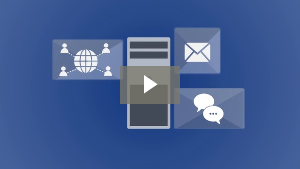When running a company, business owners soon learn the world of network security is a frightening and perilous place. With all the data breaches, social engineering attacks, and malware occurring on a daily basis, it almost seems like the odds are stacked against the small- to mid-sized business owner. Of course, to defend against these threats, companies should hire third-party IT support to provide antivirus software, intrusion prevention systems, and data backup solutions. But full system security isn’t fully achieved without developing good security habits. Here are a few to get you started.
Don’t connect to unsecure locations
Tempting as it may be to use the free WiFi in a local coffee shop or park, unsecured public networks often carry the most security risk. WiFi networks operate on public airwaves, meaning anyone nearby can tap into any computer and capture sensitive information. Hackers will usually hop onto unsecured hotspots to distribute malware, track online activity, and hijack accounts. If a connection is either free or has no password protection, it’s best to steer clear of these unsecured networks as much as possible.
Develop password security best practices
Recycled and easy-to-guess passwords like “123456” or “password” tend to be the Achilles heel of even the most fortified network security frameworks. In fact, Mark Zuckerberg made headlines this year for setting his LinkedIn password to “dadada”, and then using that same six-letter sequence for multiple accounts. And if the Facebook CEO has committed some of the worst password offences of all time, then chances are your employees are guilty of the same.
Remove this vulnerability from your system by getting your employees in the habit of setting strong and unique passwords for each online account. As a general rule, strong passwords are long and employ a combination of upper and lower case letters, numbers, and symbols. Of course, if managing all this is difficult, have your employees install password manager software like LastPass or Dashlane so they’ll only have to remember one strong, master password.
Always keep software up-to-date
With new security flaws unearthed almost weekly, it’s imperative to stay on top of the latest software security patches. Just last month, Apple immediately urged users to download iOS 10.1 after finding out that iOS 10 was vulnerable to “maliciously crafted” JPEG files. Installing software updates may be tedious now, but they can go a long way in preventing known attacks from wreaking havoc on your system tomorrow.
Educate your employees
Unlike malware or denial of service attacks, a simple phishing scam can circumvent any cyber security measure you have in place. The con artist simply has to masquerade as a trustworthy entity -- a bank teller, a technician, or a friend -- and convince the target (your employees) to willingly surrender sensitive information.
You’re probably familiar with a few methods already. The old Nigerian letter scams were classic fund transfer scams that fooled many people back in the day. Nowadays, however, phishing scams send sophisticated emails with links to seemingly legitimate websites asking their victims to verify account information. In other cases, phishers bait their targets into downloading malware-ridden email attachments.
Although anti-phishing scams and antivirus software are adequate, they can take you only so far. That’s why it’s imperative to teach your employees to be cautious of any links or attachments they encounter while traversing the web. Only security-conscious individuals can protect themselves from these exploits, and the onus is on you, the business owner, to minimize the risk by training employees to develop simple yet effective security habits.
Safe web practices can protect you from a myriad of cyber attacks, but this shouldn’t be a substitute to network security services offered by your trusted IT support provider. To achieve full system security, you need a balance of secure online habits and third-party security services. Luckily, here at IntelligisTM, we help you with both. Visit us today at www.intelligis.com.


